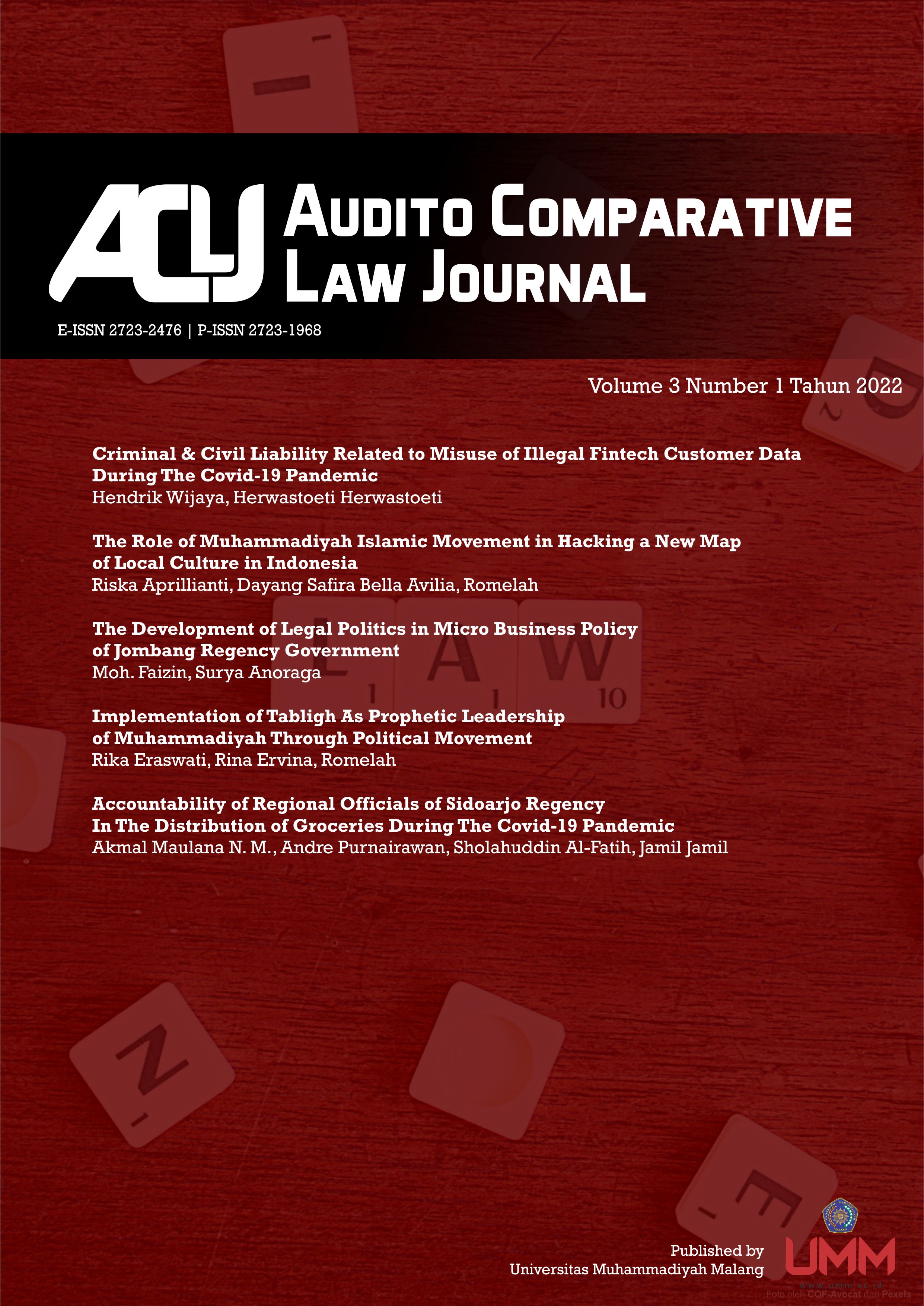The Role of Muhammadiyah Islamic Movement in Hacking a New Map of Local Culture in Indonesia
DOI:
https://doi.org/10.22219/aclj.v3i1.19857Keywords:
Muhammadiyah, Culture, Modern, ProgressAbstract
This article aims to examine the movement of Muhammadiyah. Muhammadiyah's commitments since its establishment until now is that Muhammadiyah has positioned itself as a pure creed-based Islamic da'wah movement. Muhammadiyah's role in creating a local culture for modern culture, Muhammadiyah has several programs launched in the field of culture. To examine those backgrounds, this article uses a historical approach to the normative juridical method. This article found that Muhammadiyah's program in the field of culture is an effort intended to develop an appreciation of art that is in line with the views of Muhammadiyah's beliefs. One of the applications of Muhammadiyah's cultural program is the development of culture-based education. Muhammadiyah is expected to be able to carry out its strategic role in terms of culture very optimally. In forming a progressive culture, Muhammadiyah does not only need a commensurate movement strategy but at the same time has a building of thought that goes beyond, so that it appears as a carrier of a progressive alternative Islamic message with a strong and superior character. From the womb of Muhammadiyah was born the transformation of Indonesian culture which is religious and progresses parallel to and even superior to other nations. Here the important role of actualizing the view of progressive Islam as declared in the One Century Congress, which is accompanied by the strategy of the enlightenment movement (a movement that liberates, empowers, and advances) in all its orientations and steps.Downloads
References
Al-Fatih, S. (2021). House of Role as an Effort to Protect Children From Violence: An Indonesian Perspective. Audito Comparative Law Journal, 2(1), 1–10. https://doi.org/10.22219/aclj.v2i1.15145
Ali, M. (2016). Membedah Tujuan Pendidikan Muhammadiyah. Profetika Jurnal Studi Islam, 17(1), 43–56. https://doi.org/10.23917/profetika.v17i01.2099
Anis, A. (2019). Muhammadiyah Dalam Penyebaran Islam. Jurnal Mimbar, 5(2), 65–80. https://doi.org/10.47435/mimbar.v1i1.279
Burhani, A. N. (2006). The Ideological Shift of Muhammadiyah From Cultural Into Puritanical Tendency in 1930s. Jurnal Masyarakat Dan Budaya, 8(1), 1–22. https://doi.org/10.14203/jmb.v8i1.178
Burhani, A. N. (2019). Untuk Islam Berkemajuan. Maarif Arus Pemikiran Islam Dan Sosial, 14(2), 75–84. https://doi.org/10.47651/mrf.v14i2.63
Harahap, N. (2014). Penelitian Kepustakaan. Iqra’, 8(1), 68–73. Retrieved from http://dx.doi.org/10.30829/iqra.v8i1.65
Huda, S., & Kusumawati, D. (2019). Muhammadiyah Sebagai Gerakan Pendidikan. Tarlim Jurnal Pendidikan Agama Islam, 2(2), 163–173. https://doi.org/10.32528/tarlim.v2i2.2607
Kahfi, M. (2020). Peranan Muhammadiyah Sebagai Gerakan Islam Berkemajuan di Era Modern. Al-Risalah Jurnal Studi Agama Dan Pemikiran Islam, 11(2), 110–128. https://doi.org/10.34005/alrisalah.v11i2.590
Khomaeny, E. F. F. (2018). Seni dan Budaya dalam Perspektif Muhammadiyah. Magelaran: Jurnal Pendidikan Seni, 1(1), 35–50. https://doi.org/10.35568/magelaran.v1i1.246
Luthfi, F., & Mq, W. L. (2019). Sinergitas Nahdlatul Ulama dan Muhammadiyah dalam Pengembangan Ekonomi Islam di Indonesia. Al-Urban: Jurnal Ekonomi Syariah Dan Filantropi Islam, 3(2), 137–148. https://doi.org/10.22236/alurban_vol3/is2pp137-148
Masbullah. (2018). Konflik dan Integrasi Muhammadiyah dengan Budaya Lokal di Lombok Timur. Journal Ilmiah Rinjani, 6(2), 240–255. https://doi.org/10.12345/jir.v6i2
Mursalin, S. (2018). Akomodasi Budaya Lokal Dalam Putusan Tarjih Muhammadiyah. MIZANI:Wacana Hukum, Ekonomi Dan Keagamaan, 5(2), 159–166. Retrieved from http://dx.doi.org/10.29300/mzn.v5i2.1444
Naibei, P. (2014). Culture and Sustainable Development. Culture and Sustainable Developmemnt, 1. https://doi.org/10.13140/2.1.2692.9928
Octalia, E. (2019). Dakwah Kultural: Relasi Islam dan Budaya Lokal. Ath-Thariq Jurnal Dakwah Dan Komunikasi, 3(2), 179–192. https://doi.org/10.32332/ath_thariq.v3i2.1548
Rusydi, R. (2016). Peran Muhammadiyah (Konsep Pendidikan, Usaha-Usaha di Bidang Pendidikan, dan Tokoh). Tarbawi Jurnal Pendidikan Agama Islam, 1(2), 139–148. https://doi.org/10.26618/jtw.v1i2.367
Sulistya, A. Q. P. (2020). Protection Of The Civilian Population As The Implementation Of The Principle Of Discrimination. Audito Comparative Law Journal (ACLJ), 1(2), 94–104. Retrieved from https://doi.org/10.22219/audito.v1i2.13753
Sumadi, E. (2018). Pendidikan Islam Dalam Perprektif Ilmunya Kuntowijoyo. Hikmatuna Journal For Integrative Islamic Studies, 4(2), 149–165. https://doi.org/10.28918/hikmatuna.v4i2.1274
Wardana, A. (2017). Peran Muhammadiyah Dalam Meretas Peta Baru Kebudayaan Islam Di Indonesia. Dinamika UMT, 2(2), 78–88. Retrieved from http://dx.doi.org/10.31000/dinamika.v2i2.1439
Widyakso, R., & Wiryani, F. (2021). Analisis Pelaksanaan Putusan Peradilan Agama Terhadap Nafkah Perceraian Dalam Perspektif Hukum Nasional dan Hukum Islam Bagi PNS. Audito Comparative Law Journal (ACLJ), 2(2), 86–109. https://doi.org/10.22219/aclj
Zain, H. A., Wiryani, F., & Hasanah, I. (2021). Kesadaran Hukum Sertifikasi Halal Pelaku Usaha Rumah Makan di Kota Malang. Indonesian Law Reform Journal, 1(1), 122–142. https://doi.org/10.22219/ilrej.v1i1.16130
Zarro, M., Yunani, Y., & Dhita, A. N. (2020). Muhammadiyah Sebagai Gerakan Islam dan Pendidikan. Factum Jurnal Sejarah Dan Pendidikan Sejarah, 9(1), 61–66. https://doi.org/10.17509/factum.v9i1.21503
Downloads
Published
How to Cite
Issue
Section
License
Copyright (c) 2022 Riska Aprillianti, Dayang Safira Bella Avilia, Romelah

This work is licensed under a Creative Commons Attribution-ShareAlike 4.0 International License.








